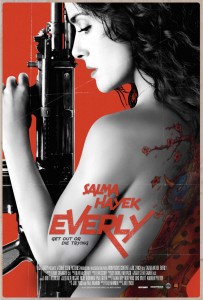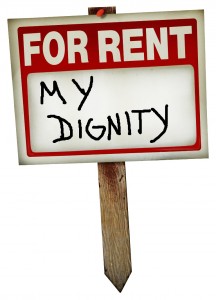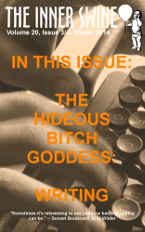The Video Gaming of Movies
I recently watched the film Everly, directed by Joe Lynch and starring Salma Hayek, specifically so I could write this little essay, because I suspected that it would be a good place to start. Everly is a simple film despite the sheer number of corpses and gunfire – it’s also not exactly a good film. But that doesn’t actually matter for my larger point.
To get it out of the way (and SPOILERS HO!) here’s the basics: Hayek is a woman who has forced into prostitution by a very, very bad man, and has been living as a prisoner in a nice apartment, forced to never see her daughter or mother. Planning to betray the crime boss, her intentions are exposed and he sends a group to gang-rape her and then kill her in revenge, but she has a gun and a phone hidden in the bathroom and manages to kill them all. The crime boss sends wave after wave of people to kill her, and she manages to survive through a mix of luck, determination, and a very high tolerance for pain.
To say the film is inconsistent would be an understatement: It picks up ideas, plays with them a little, then discards them. It throws in several pointless moments of “excitement.” It has no relationship with reality at all. For all that, it’s kind of entertaining, actually. Some of that goes to the script, which is mildly witty, and some goes to the direction, which is occasionally arresting. And some of it goes to Hayek, who looks good with a machine gun and manages to sell the emotion when she’s not gunning down nameless thugs.
But mainly, the movie entertains because it’s essentially a video game run-through.
CUT SCENES FOR THE PLOT, Y’ALL
This is an increasingly popular form of action movie. It doesn’t matter much what the plot is, or the genre, or anything else. The main thing is, the film is structured like a video game: Quick setup, then a series of levels, each with its own challenges, special look, and sometimes a specific Boss battle.
Dredd was like this, too. These films are marked by the wave-after-wave structure, where the hero fights off a wave of adversaries, gets a brief respite (level loading) and then wades in again. The waves of thugs get either increasingly tough, show up in increasing numbers, or become increaingly bizarre as the hero advances through the game, er, story.
Everly follows this pretty closely: The thugs going after the title character start off relatively weak (they’re the other prostitutes in the building, who are offered a reward if they kill her). Then some standard-issue criminals in black suits and better weaponry show up. Then some bizarre torturer Boss-type guy, then a police SWAT unit with body armor and assault rifles, then the Big Boss himself with an RPG, a katana, and a nice suit. Every time Everly kills off a wave, there’s a sequence of quiet akin to a cutscene, where the story advances until the next level loads up, I mean, the next scene begins.
You Know, For Kids
Now, this isn’t an awful way to set up a film (and I liked Dredd very much if I didn’t think Everly was so great) when what you’re going for is that breathless, adrenaline-soaked experience. But the model is very clearly video games, and I can’t help but wonder if this is a conscious attempt to capture the youth market, where a lot of kids have come to prefer the way video games tell stories. The rhythms of action/cutscene/action, the stylized violence, the increasingly bizarre Bosses – it all matches up pretty well.
It’s been theorized that Video Games might someday be the future of visual storytelling – aside from action games, games like Gone Home or Myst had the feel of being inside a movie, walking around (albeit in Myst’s case the movie was an insanely dull one) and I can see it. Once graphics become truly realistic, why not – games like Half Life and Portal and others are already very story-driven in some ways, and, frankly, there’s something exciting about the idea that you could “re-play” a movie and explore different areas and plot options, etc. And instead of sequels, there would be downloadable content.
Although, as I get older, that would make watching a movie exhausting. But at least there would be speed run-throughs on YouTube.










